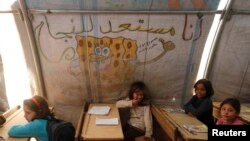With U.S.-led airstrikes coming in overhead and daily battles on the streets by rival extremists and government forces, the view from the ground in Syria is that lasting victory could well depend on who has the most effective long-term strategy — that is say, who best feeds and educates the children.
According to Wesam Sabaaneh, director of the Jafra Foundation, a relief and youth development group working inside Syria, Islamic State extremists take special care to educate children, teaching them right and wrong through their version of Islamic curricula.
“They try to invest in the future, and they are one of the rare political organizations really investing in the future through working with the children from a young age, about six years old. They take them to special IS schools and teach them their principles of religion,” Sabaaneh told VOA in a Skype interview.
The Islamic State group has published manifestos that dictate how children should be educated.
The militants have eliminated classes in art, music, history, geography, civics, philosophy, sociology and psychology. Math teachers are to remove questions that refer to moneylending, democracy and elections. Biology teachers are not to teach evolution.
According to one manifesto, girls under the Islamic State are only to be taught from age 7 to 15, and classes should be focused on Islamic law and raising children. There are reports that young boys chosen for the IS fighting cadre are being trained to kill.
The Islamic State approach has been effective, said Sabaaneh. “It is working very well. After one year you see a big change in their [the children's] behavior, in how they see life, in how they see others. They become more extremist.”
A Different Narrative
Concerns go beyond just the Islamic State. Juliette Touma, a UNICEF spokeswoman based in Jordan, said "there is a concern that children inside Syria might be indoctrinated, especially when it comes to the encouragement of violence, or taking up arms, or being recruited into armed forces and armed groups to fight in the conflict.”
Samantha Nutt of the nonprofit organization War Child, said that as long as all sides are intent on manipulating education and religion to advance their particular ideology, then children will "continue to be pawns in a very nasty game."
“It is really important to provide children a counternarrative, one that will hopefully reduce the chance of conflict in the long term,” Nutt told VOA.
Sabaaneh criticized the anti-Islamic State approach by the U.S.-led coalition of “fighting IS from the sky,” referring to the airstrike campaign aimed at degrading the militant group.
“To fight IS is to fight the idea of extremism in society, and for that, you don’t need to bomb,” he argued.
Sabaaneh warned that without a coherent approach toward social and religious inclusion, the conflict would persist, and even if anti-IS forces were to win, they would face another problem once the Islamic State-educated children grew up.
Focus on Education
For the millions of children displaced by the violence across Syria and Iraq in areas resisting the Islamic State or sitting in refugee camps, there is not enough emphasis on education, nongovernmental agencies say.
“We are talking about some children who have not been to school for more than four years. Some have never been to school at all,” Touma said. “Children need to be educated. Children need to have the skills to rebuild Syria when peace comes back to the country.”
According to Touma, there are now 2.7 million Syrian children out of school, with 700,000 of those scattered around refugee camps in neighboring countries.
The crisis in Iraq is similar. With Islamic State militants seizing large tracts of land and cities, millions of people have been displaced inside Iraq, sometimes overnight. The conflicts in Syria and Iraq are having a disturbing ripple effect in Jordan, Lebanon, Egypt and Turkey, Touma said.
"We estimate at UNICEF that there are more than 14 million [children] around the region who are in need of assistance," she said. "That wasn't the case a year ago."
Nutt, who recently visited the Syrian-Jordanian border, said some Syrian refugee children are being integrated into school systems in neighboring Jordan, Lebanon and Turkey. But there are no common curricula across the region, so many of those children are being held back.
“I interviewed a number of Syrian children who didn't want to go to school because they felt embarrassed. Other kids would tease them because they were older,” Nutt said.
Funds for Schooling
While most of the NGOs agreed that education should be a priority, funding to support schools or even develop distance learning is at risk of shortfalls.
When looking at education in terms of a conflict entering its fifth year, with no end in sight, "that is a very large investment over multiple years,” explained Nutt. “The unfortunate reality — and this is true in any war zone — is that when a conflict drags on, people’s attention span begins to wane. Their support for the crisis begins to decline.”
Nutt said combating extremism requires long-term thinking.
“We really have to have longer-term strategies," she said. "We have to plan in five- to 10-year increments, instead of three to six months.”





